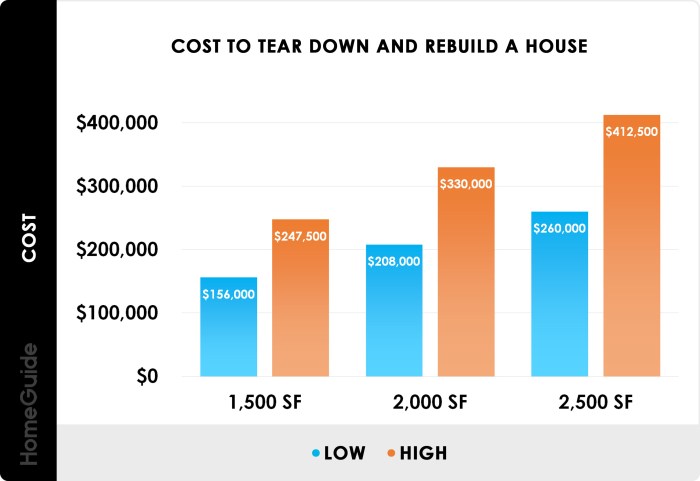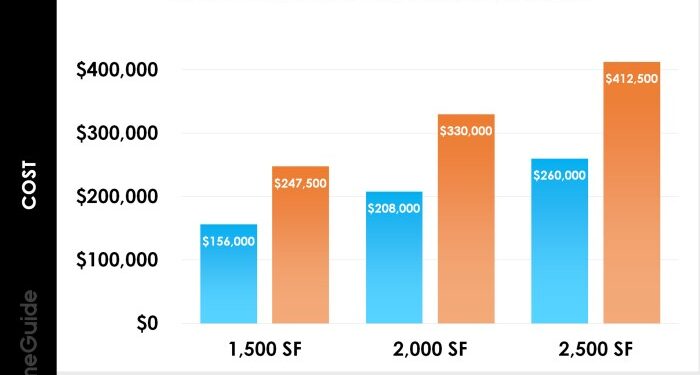Home demolition and rebuilding costs are crucial aspects to consider when embarking on a renovation project. This guide delves into the various factors that influence these expenses, providing valuable insights for homeowners looking to undergo such endeavors.
As we navigate through the breakdown of demolition and rebuilding phases, along with budgeting tips, readers will gain a deeper understanding of the financial implications involved in revamping their homes.
Factors Affecting Home Demolition and Rebuilding Cost
When it comes to the cost of demolishing and rebuilding a home, various factors come into play that can significantly impact the overall expenses. From the location of the property to the size of the structure and the materials used, each element plays a crucial role in determining the final cost.
Location
The location of the property can have a significant impact on the cost of demolishing and rebuilding a home. Factors such as accessibility, local regulations, and availability of labor and materials can vary from one area to another, influencing the overall expenses.
Size of the Property
The size of the property, including the square footage of the existing structure, can also affect the cost. Larger homes typically require more labor and materials for both demolition and rebuilding, leading to higher expenses compared to smaller properties.
Materials Used
The materials used in the construction and rebuilding process can greatly influence the overall cost. High-end materials and finishes will naturally drive up the expenses, while opting for more cost-effective options can help keep the budget in check.
Labor Costs
Labor costs are another key factor that can impact the total cost of demolishing and rebuilding a home. Skilled labor is essential for a successful project, and the rates can vary based on the location, expertise required, and the scope of work involved.
Demolishing an Existing Structure vs. Building from Scratch
Deciding between demolishing an existing structure or building a new one from scratch can have different cost implications. While demolishing an old home may involve additional expenses for clearing the site and disposing of debris, building a new home from the ground up can incur higher construction costs but potentially lower overall expenses in the long run.
Cost Breakdown
When it comes to the demolition phase of a home project, there are several key expenses to consider. From obtaining permits to hiring contractors and handling waste disposal, each step can contribute to the overall cost of the project.
Permit Costs
Obtaining the necessary permits for a home demolition can vary depending on the location and size of the project. Permit costs typically cover the review process, inspections, and ensuring compliance with local regulations.
Demolition Contractor Fees
Hiring a professional demolition contractor is essential for safely and efficiently tearing down a home. The cost of demolition contractors can vary based on the size of the home, materials used in construction, and the complexity of the project.
Site Preparation Expenses
Before demolition can begin, the site must be properly prepared. This may involve clearing the area, disconnecting utilities, and securing the site for safety. Site preparation costs can add to the overall expenses of the project.
Waste Disposal Charges
Disposing of the debris and waste from a demolition project is another significant cost to consider. Waste disposal charges can vary depending on the amount of material generated and the method of disposal chosen.
Unforeseen Circumstances Impacting Costs
Unexpected issues such as the discovery of hazardous materials or structural problems during demolition can significantly impact costs. Dealing with these unforeseen circumstances may require additional safety measures, specialized equipment, and expert handling, all of which can add to the total cost of the project.
Cost Breakdown
When it comes to the rebuilding phase after the demolition of a home, there are various costs to consider. From architectural design to construction materials, labor, utilities installation, and finishing touches, each aspect plays a crucial role in determining the overall cost of rebuilding a home.
Architectural Design
Architectural design is a significant cost in the rebuilding phase. Hiring an architect to create detailed plans and blueprints for the new home can be expensive, especially if customization and unique features are involved. The complexity of the design and the size of the home can also impact the cost significantly.
Construction Materials
The cost of construction materials is another important factor to consider
Labor
Labor costs for construction workers, contractors, and other professionals involved in the rebuilding process are a significant part of the overall expenses. The skill level of the laborers, the duration of the project, and any unforeseen delays can all affect labor costs.
Utilities Installation
Installing utilities such as plumbing, electrical wiring, and HVAC systems is essential for a functional home. The cost of utilities installation will depend on the size of the home, the complexity of the systems, and any specific requirements or upgrades.
Finishing Touches
Finishing touches such as flooring, paint, fixtures, and landscaping can add up quickly in terms of cost. Customization, upgrades, and delays in the finishing phase can all impact the overall cost of rebuilding a home. It's essential to budget for these finishing touches to ensure the new home meets your expectations.
Budgeting Tips for Home Demolition and Rebuilding

When embarking on a home demolition and rebuilding project, it's crucial to have a solid budget in place to avoid financial surprises along the way. Here are some practical tips to help homeowners budget effectively for their renovation:
Prioritize Expenses
- Identify must-have elements of your new home design and allocate a larger portion of your budget to these priorities.
- Consider areas where you can save money without compromising on quality, such as opting for cost-effective materials or fixtures.
Obtain Multiple Quotes
- Reach out to multiple contractors to get quotes for the demolition and rebuilding work, ensuring you compare prices and services offered.
- Ask for detailed breakdowns of costs to understand where your money is going and to identify any potential savings.
Set Aside Contingency Funds
- Allocate a portion of your budget for unexpected expenses or changes that may arise during the renovation process.
- Experts recommend setting aside at least 10-20% of your total budget as a contingency fund to cover any unforeseen costs.
Negotiate with Contractors
- Don't be afraid to negotiate with contractors to get the best possible price for the work while ensuring quality and reliability.
- Discuss payment schedules, timelines, and any potential discounts or incentives for early payment.
Plan Ahead and Create a Realistic Budget
- Start planning your budget well in advance of the project start date to allow time for research and adjustments.
- Consider all aspects of the demolition and rebuilding process, including permits, labor costs, materials, and any additional fees.
Wrap-Up
In conclusion, understanding the intricacies of home demolition and rebuilding costs is key to successful renovation projects. By following the tips and insights shared in this guide, homeowners can better prepare themselves financially for the journey ahead.
Essential Questionnaire
What are some key factors influencing home demolition and rebuilding costs?
Factors include location, property size, materials used, and labor costs.
What expenses are involved in the demolition phase?
Expenses include permits, contractors, site preparation, waste disposal, and inspections.
What costs are associated with the rebuilding phase?
Costs include design, materials, labor, utilities, and finishing touches.
How can homeowners effectively budget for such projects?
Tips include prioritizing expenses, obtaining multiple quotes, setting aside contingency funds, and planning ahead.










